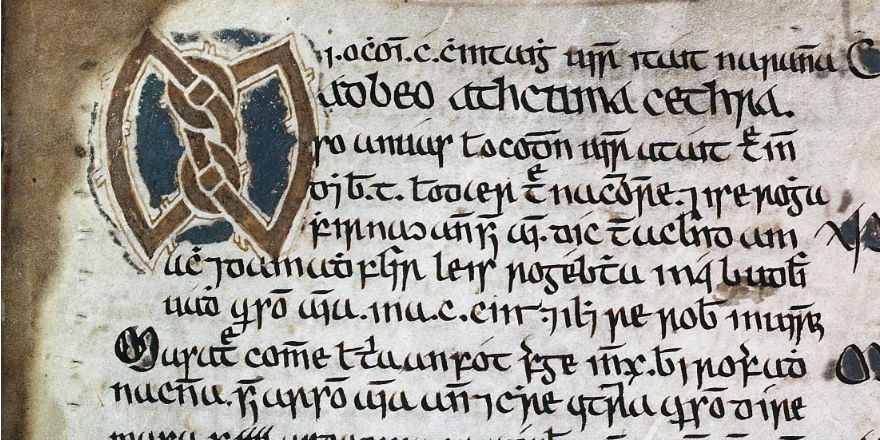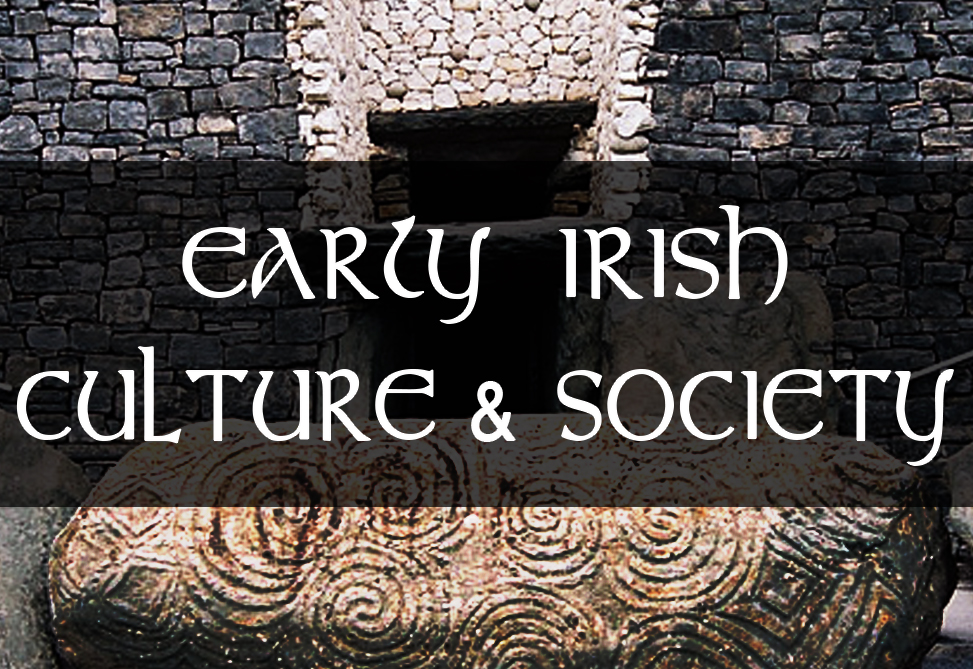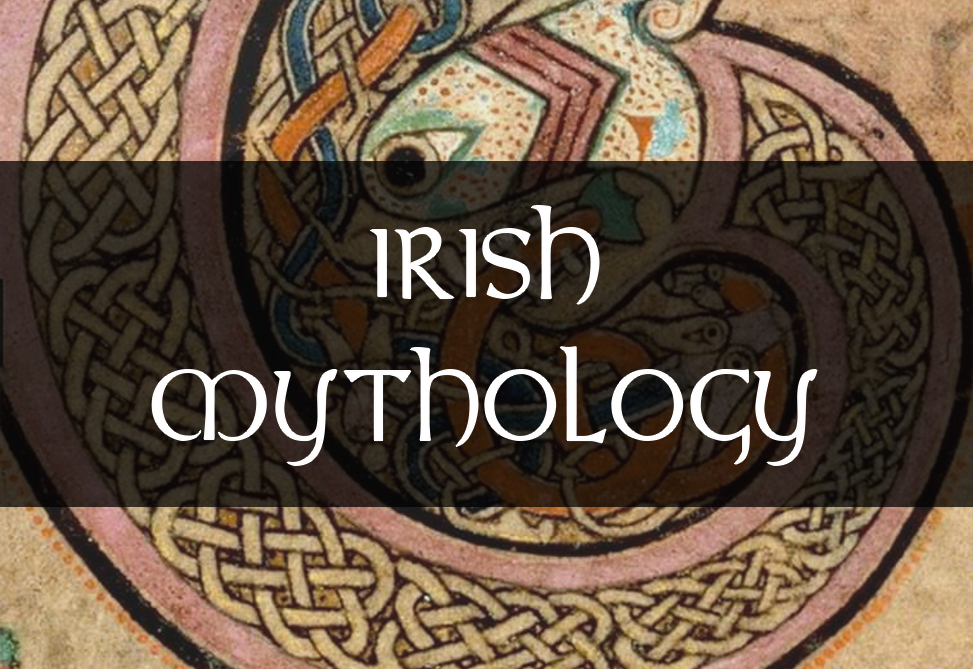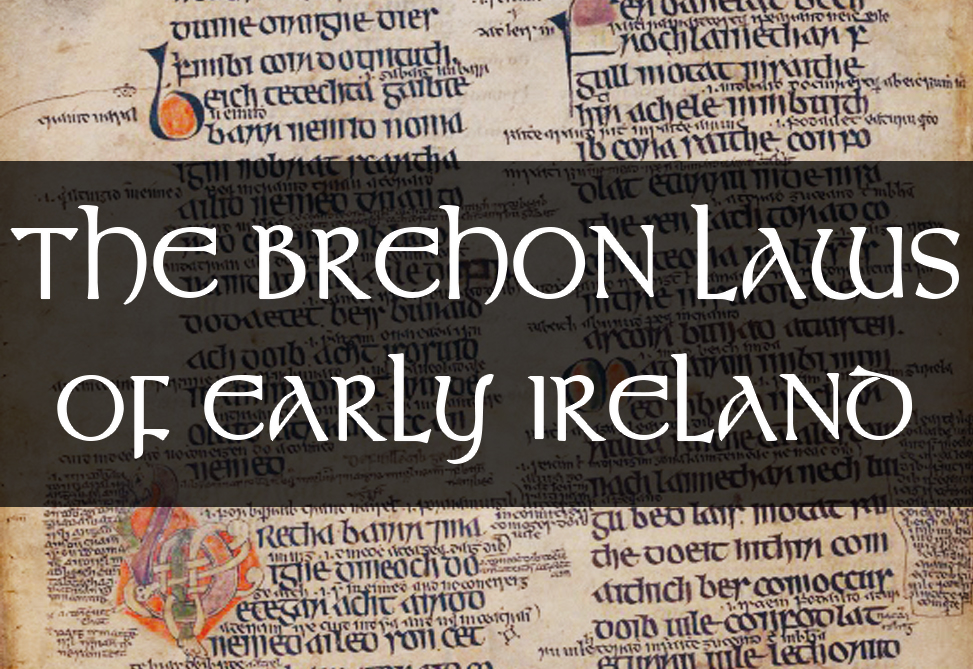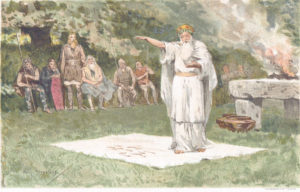The Corpus Iuris Hibernici (CIH) is an invaluable collection of medieval Irish legal texts that sheds light on the native legal system of Ireland, known as Brehon Law. This extraordinary compilation, assembled by the prominent Irish scholar D.A. Binchy between 1963 and 1978, spans six volumes and encompasses legal material from numerous manuscripts, some of which date back to the 7th century. Written in Old Irish and Latin, the CIH provides a unique window into early Irish society, politics, and culture, proving to be a treasure trove for historians, linguists, and scholars interested in uncovering the intricacies of Ireland’s distinctive legal traditions.
The Corpus Iuris Hibernici: A Comprehensive Collection of Irish Legal Texts
The CIH is a testament to the immense effort and dedication of D.A. Binchy, who meticulously compiled and edited these texts over a 15-year period. The six-volume work contains legal material from a wide range of manuscripts, including some of the oldest surviving Irish legal texts, dating as far back as the 7th century. These manuscripts, scattered across various libraries and archives, were brought together and transcribed by Binchy to create a comprehensive collection of Brehon Law sources.
The CIH provides a wealth of information about early Irish society, offering insights into social organization, land tenure, marriage, divorce, inheritance, and criminal law. The texts reveal the importance of kinship and the role of the extended family in maintaining social order. Additionally, the CIH offers a glimpse into the political landscape of medieval Ireland, highlighting the complex relationships between various kingdoms and the legal mechanisms that governed these interactions.
Moreover, the CIH allows scholars to explore the rich cultural heritage of Ireland. From poetry and proverbs woven into legal texts to the influence of Christianity on Brehon Law, the CIH serves as a fascinating record of early Irish cultural practices and traditions.
The CIH has had a profound impact on the study of Irish history and culture. For historians, it provides a wealth of primary source material, enabling a deeper understanding of the political, social, and cultural landscape of early medieval Ireland. Linguists, on the other hand, can study the Old Irish and Latin texts to trace the development of the Irish language and the influence of Latin on Irish legal terminology.
The CIH is also a valuable resource for scholars of law and legal history, as it offers a unique perspective on Ireland’s native legal system, distinct from the Roman and English legal traditions. Through the study of Brehon Law, scholars can gain insight into the complexities of Ireland’s legal past and its contribution to the broader history of legal systems worldwide.
Manuscripts Used by D.A. Binchy in the Corpus Iuris Hibernici
In his monumental work, the Corpus Iuris Hibernici, D.A. Binchy used a wide range of manuscripts from various institutions to compile the texts. Binchy’s extensive use of these manuscripts demonstrates his meticulous approach to compiling the Corpus Iuris Hibernici. His work remains a crucial resource for historians, linguists, and scholars interested in studying Ireland’s unique legal traditions.
Here is a list of the primary manuscripts used in the CIH:
“Rawlinson B 487” Oxford, Bodleian Library, MS Rawlinson B 487/ff. 53-67
“Rawlinson B 506” Oxford, Bodleian Library, MS Rawlinson B 506/ff. 16b-62
“TCD E 3. 5” Dublin, Trinity College, MS 1433 (E 3. 5), ff. 1a-60b
“Harleian 432” London, British Library, MS Harley 432, ff. 1a-20d
“TCD H 2. 15a” Dublin, Trinity College, MS 1316, pp. 11a-42b
“TCD H 2. 15a” Dublin, Trinity College, MS 1316, pp. 47a-66b
“TCD H 2. 15a” Dublin, Trinity College, MS 1316, pp. 43a-46b
“TCD H 2. 15a” Dublin, Trinity College, MS 1316, pp. 78a-86b
“TCD H 3. 18” Dublin, Trinity College, MS 1337, pp. 1a-25b • Dublin, Trinity College, MS 1337, f. 46(A)v • Dublin, Trinity College, MS 1337, pp. 57b-83b • Dublin, Trinity College, MS 1337, pp. 88a-151 • Dublin, Trinity College, MS 1337/5 • Dublin, Trinity College, MS 1337/6 • Dublin, Trinity College, MS 1337/7 (pp. 138-151) • Dublin, Trinity College, MS 1337, pp. 157-209a • Dublin, Trinity College, MS 1337, pp. 214a-227b • Dublin, Trinity College, MS 1337, pp. 227b-518b • Dublin, Trinity College, MS 1337/10 • Dublin, Trinity College, MS 1337/11 • Dublin, Trinity College, MS 1337/12 • Dublin, Trinity College, MS 1337/13 • Dublin, Trinity College, MS 1337/14 • Dublin, Trinity College, MS 1337/15 • Dublin, Trinity College, MS 1337/16 • Dublin, Trinity College, MS 1337/17 • Dublin, Trinity College, MS 1337, pp. 628b-654b • Dublin, Trinity College, MS 1337/20 (pp. 629-660) • Dublin, Trinity College, MS 1337, pp. 871a-874
“TCD H 2. 15b” Dublin, Trinity College, MS 1317, pp. 135a-156b
“RIA MS 23 Q 6” Dublin, Royal Irish Academy, MS 23 Q 6, pp. 1a-10b • Dublin, Royal Irish Academy, MS 23 Q 6, pp. 19a-26b • Dublin, Royal Irish Academy, MS 23 Q 6, pp. 11a-18b • Dublin, Royal Irish Academy, MS 23 Q 6, pp. 27a-52b
“RIA MS 23 P 3” Dublin, Royal Irish Academy, MS 23 P 3, ff. 20a-25d
“BL, Egerton 88” London, British Library, MS Egerton 88, ff. 1a-8d • London, British Library, MS Egerton 88, ff. 15a-61d • London, British Library, MS Egerton 88, ff. 79a-92c • London, British Library, MS Egerton 88, f. 34r
“H 4. 22” Dublin, Trinity College, MS 1363, pp. 3-36b • Dublin, Trinity College, MS 1363, pp. 50-88 • Dublin, Trinity College, MS 1363/4 (pp. 40-53) • Dublin, Trinity College, MS 1363 • Dublin, Trinity College, MS 1363, p. 211a-211b
“The Book of Ballymote” Dublin, Royal Irish Academy, MS 23 P 12, pp. 355a-348b • London, British Library, MS Egerton 90, ff. 8a-9d • London, British Library, MS Egerton 90, ff. 11a-13d • London, British Library, MS Egerton 90, ff. 10r-10v • London, British Library, MS Egerton 90, ff. 14a-16d
“H 3. 17” Dublin, Trinity College, MS 1336, col. 1-p. 436 (continued in vol. 6): Dublin, Trinity College, MS 1336
Dublin, Trinity College, MS 1336, p. 436-col. 673 Dublin, Trinity College, MS 1336 • Dublin, Trinity College, MS 1336/4
Dublin, Trinity College, MS 1336, cols 679a-680: Dublin, Trinity College, MS 1336 • Dublin, Trinity College, MS 1336/4 • Dublin, Trinity College, MS 1336/5
Dublin, Trinity College, MS 1336, cols 778-779: Dublin, Trinity College, MS 1336
Dublin, Trinity College, MS 1336, cols 841-855: Dublin, Trinity College, MS 1336
Dublin, Trinity College, MS 1387, pp. 1a-7b: Dublin, Trinity College, MS 1387
Dublin, Trinity College, MS 1387, p. 27a-27b Dublin, Trinity College, MS 1387
Dublin, Trinity College, MS 1387, pp. 8a-26b: Dublin, Trinity College, MS 1387
Dublin, Trinity College, MS 1387, pp. 28a-31b: Dublin, Trinity College, MS 1387
Oxford, Bodleian Library, MS Rawlinson B 502, ff. 62d-63d: Oxford, Bodleian Library, MS Rawlinson B 502
Dublin, Trinity College, MS 1308 Dublin, Trinity College, MS 1308
London, British Library, MS Additional 4783, London, British Library, MS Additional 4783/ff. 3-7
London, British Library, MS Nero: London, British Library, MS Cotton Nero A vii/ff. 132-157
Copenhagen, Det Kongelige Bibliotek, MS 261B Copenhagen, Det Kongelige Bibliotek, MS NKS 261b
Dublin, National Library of Ireland, MS G 3 Dublin, National Library of Ireland, MS G 3
Dublin, National Library of Ireland, MS G 11, Dublin, National Library of Ireland, MS G 11
Dublin, Royal Irish Academy, MS C i 2, f. 41(A)r-41(A)v Dublin, Royal Irish Academy, MS C i 2
Dublin, Trinity College, MS 1318, cols 920-938 Dublin, Trinity College, MS 1318/16 (cols 573-958)
Dublin, Trinity College, MS 1432, pp. 16b-18a Dublin, Trinity College, MS 1432
Dublin, Trinity College, MS 1432, pp. 21b-23b Dublin, Trinity College, MS 1432
About D.A. Binchy
Daniel Anthony Binchy (1899-1989) was a distinguished Irish scholar with expertise in linguistics and Early Irish law. His educational journey began at Clongowes Wood College (1910-1916), followed by University College Dublin (UCD) and the King’s Inns (1917-1920), where he prepared for a career at the bar. Additionally, Binchy pursued his academic interests at prestigious universities in Munich, Berlin, and Paris.

From 1919 to 1920, he served as the Auditor of the Literary and Historical Society of UCD. In 1949, he took up a position as a senior professor of Celtic studies at the Dublin Institute for Advanced Studies, where he was humorously portrayed in Flann O’Brien’s poem “Binchy and Bergin and Best.”
“Binchy and Bergin and Best”:
‘My song is concern’
Flann O’Brien
Three sons of great learnin’
Binchy and Bergin and Best,
They worked out that riddle
Old Irish and Middle,
Binchy and Bergin and Best,
they studied far higher
Than ould Kuno Meyer
And fanned up the glimmer
Bequested by Zimmer
Binchy and Bergin and Best.
They rose in their nightshift
To write for the Zeitschrift,
Binchy and Bergin and Best,
They proved they were bosses
At wrastling with glosses,
Binchy and Bergin and Best,
they made good recensions
Of ancient declensions,
And careful redactions
To their three satisfactions
Binchy and Bergin and Best.
The went for a dander
With Charlie Marstrander
Binchy and Bergin and Best.
They added their voices
(Though younger) to Zeuss’s,
Binchy and Bergin and Best.
Stout chase the three gave
Through the Táin for Queen Maeve
And played “Find the Lady”
With Standish O’Grady,
Binchy and Bergin and Best.
They sang in the coir
Of the Institute (Higher)
Binchy and Bergin and Best,
And when they saw fit
The former two quit,
Binchy and Bergin and Best
But the third will remain
To try to regain
At whatever coset
Our paradigms lost,
Binchy and Bergin and Best.
So forte con brio
Three cheers for the trio,
Binchy and Bergin and Best,
These friends of Pokorni
Let’s toast in Grand Marnier,
Binchy and Bergin and Best –
These justly high-rated,
Advanced, educated,
And far from facetious
Three sons of Melesius,
Binchy and Bergin and Best.’
Binchy’s diplomatic career saw him appointed as Ireland’s ambassador to Germany between 1929 and 1932. It was during his tenure in Germany that he received guidance from Rudolf Thurneysen, which enabled him to delve into the study of Early Irish Law. For a period, Binchy was the primary academic researcher in this legal domain, and his theories were widely accepted. However, some of his ideas connecting early Irish law to Celtic Law and even Indo-European law have since been scrutinized and challenged.
Despite this, Binchy’s lasting contributions include numerous translations and editions of legal texts. His crowning achievement, the six-volume Corpus Iuris Hibernici, compiled virtually all the texts in the native Irish legal tradition, providing a solid foundation for future scholars to build upon. In recognition of his work, Binchy was elected a Foreign Honorary Member of the American Academy of Arts and Sciences in 1962.
Aside from his impressive academic and diplomatic accomplishments, Binchy was also the uncle of famed author Maeve Binchy and esteemed academic William Binchy. You can read more about the exceptional life of D.A. Binchy here: The Lives of Daniel Binchy: Irish Scholar, Diplomat, Public Intellectual by Tom Garvin review.
